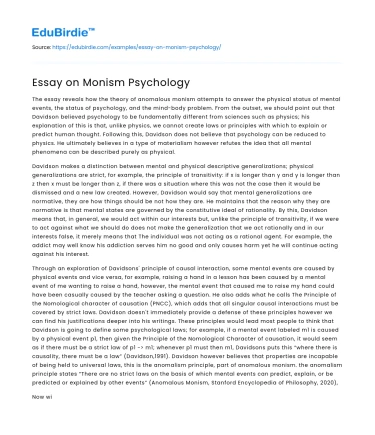The essay reveals how the theory of anomalous monism attempts to answer the physical status of mental events, the status of psychology, and the mind-body problem. From the outset, we should point out that Davidson believed psychology to be fundamentally different from sciences such as physics; his explanation of this is that, unlike physics, we cannot create laws or principles with which to explain or predict human thought. Following this, Davidson does not believe that psychology can be reduced to physics. He ultimately believes in a type of materialism however refutes the idea that all mental phenomena can be described purely as physical.
Davidson makes a distinction between mental and physical descriptive generalizations; physical generalizations are strict, for example, the principle of transitivity: if x is longer than y and y is longer than z then x must be longer than z, if there was a situation where this was not the case then it would be dismissed and a new law created. However, Davidson would say that mental generalizations are normative, they are how things should be not how they are. He maintains that the reason why they are normative is that mental states are governed by the constitutive ideal of rationality. By this, Davidson means that, in general, we would act within our interests but, unlike the principle of transitivity, if we were to act against what we should do does not make the generalization that we act rationally and in our interests false, it merely means that The individual was not acting as a rational agent. For example, the addict may well know his addiction serves him no good and only causes harm yet he will continue acting against his interest.
Save your time!
We can take care of your essay
- Proper editing and formatting
- Free revision, title page, and bibliography
- Flexible prices and money-back guarantee
Through an exploration of Davidsons' principle of causal interaction, some mental events are caused by physical events and vice versa, for example, raising a hand in a lesson has been caused by a mental event of me wanting to raise a hand, however, the mental event that caused me to raise my hand could have been casually caused by the teacher asking a question. He also adds what he calls The Principle of the Nomological character of causation (PNCC), which adds that all singular causal interactions must be covered by strict laws. Davidson doesn't immediately provide a defense of these principles however we can find his justifications deeper into his writings. These principles would lead most people to think that Davidson is going to define some psychological laws; for example, if a mental event labeled m1 is caused by a physical event p1, then given the Principle of the Nomological Character of causation, it would seem as if there must be a strict law of p1 -> m1; whenever p1 must then m1, Davidsons puts this “where there is causality, there must be a law” (Davidson,1991). Davidson however believes that properties are incapable of being held to universal laws, this is the anomalism principle, part of anomalous monism. the anomalism principle states “There are no strict laws on the basis of which mental events can predict, explain, or be predicted or explained by other events” (Anomalous Monism, Stanford Encyclopedia of Philosophy, 2020),
Now with an understanding of his three principles which seem to be at odds with each other; for example, the principles of causal interaction and the principle of nomological character of causality dictate that strict rules behind the interaction of mental and physical whilst the anomalous principle says there can't be strict rules. Within Essays on Actions and Events Davidson admits that many philosophers see the first two premises to be in contention with the anomalism principle, Davidson says that instead of focusing on how they are inconsistent we should instead realize that they hold true, independent of inconsistency and instead “explain away the appearance of contradiction, especially the Kantian line” (Davidson, 1991). Davidsons tries to resolve this issue by saying there must be a strict law that isn't in the form we expect, take p1 -> m1, for example, Davidsons would say this isn't the strict law as its form is incorrect. He would suggest that m1 and p1 must have properties suitable to being laws, as Davidson would say m1 is not capable of being a property then there must be another property that takes in place, there can only be a closed system of strict laws within physical science not to do with mental events. Thus, any causally interactive mental event must be token-identical to a physical event (Davidson, 1991). On page 214 of Davidson's mental events we encounter what has been called Supervenice of the mental on the physical, he uses this to strengthen his argument from criticism. This addition states that if an event shares all physical properties then it should share all mental ones. 'there cannot be two events alike in all physical respects but differing in some mental respect, or ... an object cannot alter in some mental respect without altering in some physical respect. ' (Davidson, 1991). It should be noted that to Davidson brain states are not identical even if the same mental event is taking place; having the mental event of recognizing it's a pleasant day will not have the same brain state as someone having the same mental event.
Goddu (1999) writes in “Is anomalous monism inconsistent?” an argument against what she calls the inconsistent triad, by using a thought experiment about possible worlds Goddu effectively shows the inconsistencies with the argument, they show that the supervenience of the mental on the physical does not hold as true. By showing that there is the potential for there to be two physically identical events but with differing mental events they have effectively removed Davidsons addition that strengthened his argument.






 Stuck on your essay?
Stuck on your essay?

